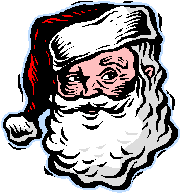SANTA CLAUS
Nicholas must be the busiest Saint in Heaven. Apart from his hectic schedule of activity every year, he is also the Patron Saint of Russia, children, sailors, virgins, bakers, pawnbroker and shopkeepers. Some people even regard him as the patron of wolves. He was born in 280 A.D. in Patara in what is now called Turkey. His parents were well-off, and they gave him a christian upbringing.
When he was only one day old, he stood for two hours in the basin in which he was being bathed and thanked God for having brought him into the world. In infancy he observed the fasts of Wednesday and Friday, he would not eat on these days.
His parents died when he was quite young, and he gave his large inheritance to the poor. He is said to have heard about a poor nobleman who had no money to give as dowries to his three daughters. The man was in fact so badly in need of money that he was about to give the girls away into a life of sin. Nicholas intervened, under cover of darkness he went to the nobleman's house, and on each of three successive nights tossed a bag of money through an open window, thus providing each daughter with a dowry.
From the legend of the three daughters comes the connection with Christmas. It is said that in this story lies the origin of the custom of placing gifts in the stockings of children.




After this, Nicholas became the patron saint of maidens and the purses of gold coins, which he is supposed to be holding in many pictures, are symbolised by the three gold balls used as the sign of the pawnbrokers.When Nicholas died in 342, he was buried in a marble tomb at Myra. Centuries later, his body was stolen by Italian merchants who did not like the idea of the saint being interred forever in an Islamic country.
The remains were taken to Bari on the east coast of Italy. There, on the 9th May 1087, they were placed in a tomb in the Church of St. Stephen. On that very day thirty people in Bari were cured of various diseases. From that day on, the tomb has been famous for pilgrimages.
His cult spread throughout Europe, and every year on 6th December some people distributed gifts. Even to this day, gifts are given in many places on that day rather than at Christmas.
Nicholas was known by many different names in different lands. Weihnachtsmann (Christian man) was his name in Germany. He was known as Pére Nöel in France and Papa Nöel in Spain. In the Netherlands, he was known as Sinter Klaas. When the Dutchmen emigrated to New Amsterdam (now New York) in the 17th Century, that dutch name was altered to Santa Claus.
People liked that new name. It had a pleasant sound, and it quickly became associated with the practice of giving gifts at Christmas.